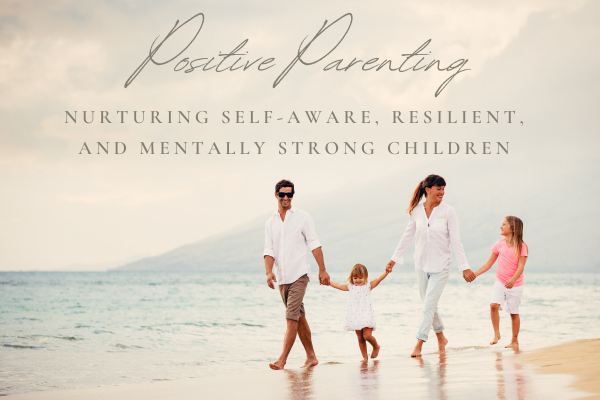✅ Introduction: What Is Positive Parenting?
Children represent the future of every nation, and it is crucial to nurture them with the right skills, emotional support, and discipline to help them reach their full potential. Parents and schools are the two most significant influences on a child’s life and development.
According to the Center on the Developing Child, Harvard University (2021), there are three core principles that help foster positive outcomes in children:
- ✅ Responsive relationships with parents
- ✅ Strengthening core skills like cognitive abilities and emotional regulation
- ✅ Reducing sources of stress to build resilience and adaptability
Parents must be attentive to their children’s fears, worries, and concerns. Although parents often strive for the best for their children, good intentions alone aren’t enough. It’s crucial to adopt effective parenting strategies that emphasize the child’s emotional health, self-awareness, and purpose in life.
In today’s competitive environment, parenting tends to focus on making children better than others, rather than becoming the best version of themselves. This often leads to children who are knowledgeable and skilled but lack self-awareness, emotional connection, and a sense of purpose.
✅ What Is Positive Parenting?
Positive Parenting integrates the principles of positive psychology into parenting practices. It focuses on:
- 🌱 Highlighting and nurturing a child’s strengths rather than focusing on weaknesses
- 🌱 Parents being mindful, self-aware, and connected to the larger goals of parenting
- 🌱 Active listening and understanding the child’s needs
- 🌱 Being a positive role model
Balanced parenting ensures that a child grows up in a structured, supportive environment where discipline, values, and emotional well-being go hand in hand.
✅ Four Parenting Styles: Control vs. Responsiveness
Parenting approaches are shaped by two key factors:
- Demand (Control): The degree to which parents set rules and expectations
- Responsiveness: The extent of warmth, support, and understanding shown to the child
Let’s decode the four parenting styles:
| Parenting Style | Control | Responsiveness | Key Features | Outcomes |
| Authoritative/ Democratic | High | High | Warmth, clear expectations, open dialogue | Independent, self-regulated, socially adept |
| Authoritarian | High | Low | Strict rules, less warmth, punitive discipline | Obedient but lower happiness, poor social adjustment |
| Permissive | Low | High | Indulgent, few boundaries, friendly role | Behavioral issues, poor self-discipline |
| Negligent/ Uninvolved | Low | Low | Neglectful, detached, minimal interaction | Emotional, social, developmental delays |
✅ Deep Dive into Parenting Styles
🟩 1. Authoritative / Democratic Parenting
- Firm but consistent discipline
- Clear standards of conduct
- Prioritizes child’s needs & abilities
- Encourages age-appropriate independence
- Democratic family climate with two-way communication
- Benefits: Fosters independence, emotional regulation, and social competence
🟧 2. Authoritarian Parenting
- High control with little warmth
- Strict, unquestioned obedience
- Low communication
- Directive and forceful behavior
- Drawbacks: Obedience but lower happiness and adaptability
🟦 3. Permissive Parenting
- High warmth, low control
- Minimal rules, rarely punish
- Acts more like a friend
- Child makes decisions independently
- Drawbacks: Behavioral problems, poor self-regulation
⬛ 4. Neglectful / Uninvolved Parenting
- Low control, low responsiveness
- Neglectful, detached parenting
- Limited interaction with the child
- Drawbacks: Emotional insecurity, cognitive delays, social issues
✅ Research on Child & Adolescent Mental Health
🌍 Global Perspective
- 🌐 13% of children & adolescents (10–19 years) suffer from a mental health disorder globally.
- 🌐 Hostile parenting doubles the risk of mental health symptoms by age 9.
🇮🇳 Indian Context
- Anxiety disorders in Indian children are linked to permissive fathers and less authoritative mothers.
- ADHD symptoms in South India show correlation with negative parenting, while positive parenting reduces hyperactivity and oppositional behavior.
- Parental interventions in India have effectively improved parenting skills, reducing emotional and behavioral problems in children.
✅ Why Positive Parenting Matters for Mental Health
Positive parenting is essential for nurturing not just academic success but also mental health and emotional resilience:
- 🧠 Builds Emotional Intelligence (EQ): Teaches children to understand and regulate their feelings.
- 🗣️ Promotes Open Communication: Establishes trust and reduces mental health stigma.
- 😊 Normalizes Emotions: Helps children see feelings like sadness, anger, and fear as normal, aiding emotional growth.
- 🌿 Nature-based Support: Outdoor activities enhance emotional well-being and reduce stress.
- 🛡️ Protective Environment: Shields children from risks like substance abuse, social withdrawal, and academic stress.
✅ Conclusion: The Power of Positive Parenting
To nurture a self-aware, emotionally balanced, and resilient child, parents must adopt a positive, mindful, and structured approach to parenting. Among all parenting styles, the Authoritative style consistently emerges as the most effective — blending warmth with discipline, guidance with freedom, and expectations with empathy.
By choosing positive parenting, we empower children not just to succeed, but to thrive with a purposeful and meaningful life.

